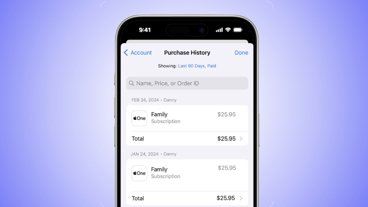Apple in talks to offer more DRM-free tracks on iTunes [updated]
MP3 AAC format without copy protection measures, a move that could further distance the digital download service from its rivals.
Citing "two music industry sources," CNet News.com claims the talks with Universal Music Group, Warner Music Group, and Sony BMG are still in the preliminary stages with nothing finalized, though one label is reportedly leaning towards an agreement.
EMI, the other member of the "big four," has been offering its entire catalog to iTunes users free of copy protection measures since April of 2007, however its tracks are being served up in AAC — a format designed to be the successor to MP3.
In addition to achieving better sound quality at certain bit rates, AAC allows Apple include custom iTunes information such as album artwork and purchase information within the same file that contains the audio track.
A switch to MP3s would rival a move on the part of Amazon.com, which launched an MP3 download service last fall and eventually gained the support of all four major record labels. The retailer has since chipped away at share of the digital audio download market, but not necessarily at Apple's expense.
Should Apple and the record labels ultimately forge a deal, the vast majority of songs purchased from iTunes would no longer be restricted for use solely on Apple's handheld products such as the iPod and iPhone. It would also serve as a serious setback to rivals such as Amazon, who would then need to devise a new way to differentiate their service offerings from the already ubiquitous iTunes.
Amid public scrutiny over the limitations of copy protected songs, Apple chief executive Steve Jobs in February of 2007 called upon the "big four" music companies to drop their anti-piracy restrictions and allow digital music tracks to be sold openly on the Internet for any brand of digital music player.
Frustrated with inflexible pricing on the iTunes Store, record labels outside of EMI have refused to cooperate with the iPod maker. They've instead signed deals with many of the company's rivals in an effort to gauge whether they can reduce Cupertino-based company's influence on digital music sales.
Meanwhile, it's reported that Universal Music is expected to join EMI and Warner in licensing their catalogs to Microsoft in MP3s for sale on the Zune Marketplace — the software giant's answer to Apple's digital download service.
Update: CNet has since changed its story to omit mention of MP3 as the format in which the new unrestricted tracks would be sold. The author responded to a comment on the matter by saying "I don't know whether my sources were just throwing out MP3 as a way to describe unprotected music." It's likely Apple would make the tracks available in unprotected 256 kbps AAC format as it does with those from EMI.
 Sam Oliver
Sam Oliver













 Amber Neely
Amber Neely
 Thomas Sibilly
Thomas Sibilly
 AppleInsider Staff
AppleInsider Staff
 William Gallagher
William Gallagher
 Malcolm Owen
Malcolm Owen
 Christine McKee
Christine McKee










65 Comments
Mp3? ...
My order of preference, when I music shop:
256 kbps AAC (iTunes Plus) - no DRM
256 kbps MP3 (Amazon) - no DRM
128 kbps AAC (regular iTunes) - has DRM
128-192 MP3 (I think I'll pass!) - no DRM
If the MP3s are 256, that's acceptable, and DRM-free is extremely welcome, but I'd rather have MP4 (aka AAC).
That would be nice, DRM free music from iTunes, but why degrade it by making it mp3? Why not just make the tracks DRM-free AAC? Even the crappiest cellphones today can play back AAC. I don't see the point. Anyone care to enlighten me?
BTW- Regarding "a move that could further distance the digital download service from its rivals.", Isn't Amazon DRM-free?
I never buy music from iTunes because of the DRM. I browse for music there because it's a great shopping experience. When I find something I want, I head to amazon to buy it DRM free. Apple has lost about 10 album sales from me due entirely to DRM and low bitrate encoding (not iTunes plus). It's not a lot, but I'm not alone either.Sheldon
Strangely enough LastFM seems to think that iTunes already offers music in MP3 format. Did they know something we didn't or was it simply a slip of the mind.